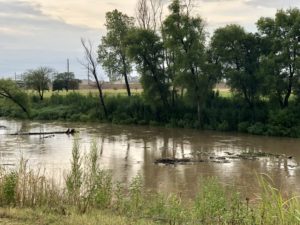By Naïma Hill

As we walked the edge of the levee overlooking the Dallas skyline, I looked out at the Trinity River and thought, oh, are those ducks? Quickly, I realized the objects floating by on the river was consistent and crowding every inch of the water, impossible to be any life form. It was trash.
I called my dog closer to make sure he didn’t make any crazy moves to get in the water, knowing it contained high levels of bacteria.
After the rains hit Dallas, pollutants from across our landscape are picked up and emptied into the Trinity. The river becomes contaminated and the only cure is time … or is it?
The Florida Governor declared a state of emergency for seven counties this week due to red tide. Red tide is caused by our overuse of pesticides and fertilizers, which wash into our watersheds leading to our oceans. The algae use these nutrients to overproduce and the water looks red in color.
The algae produce toxins harmful to sea life and to us. Red tide has killed thousands of fish, sea turtles, sea birds, sharks and manatees! People in Florida this week are warned to not swim in the water and not breathe the air nearby as it can cause respiratory issues, producing a tourism nightmare.
Are we living in denial? I think so. These situations consistently happen around us. We live in a city, built here because of its close proximity to the Trinity River, yet, we do not take pride in keeping its water quality pristine. Far from it — in fact, we let the trash roll by without a second glance. We buy food and products that were grown or made with heavy use of fertilizers or pesticides, leading to this environmental degradation. We don’t connect our actions to what we see. The big companies gain more money, and we’re none the wiser.
Monsanto (now owned by Bayer), the huge agrichemical company, was recently found liable in a lawsuit filed by a groundskeeper who alleged the glyphosate-based weed killers (Roundup) caused his cancer. Monsanto was ordered to pay $289 million in damages and now moves on to more than 5,000 more similar cases.
We don’t do enough to make sure what goes on our land is safe for us, safe for the land, and safe for the water ecosystems it ends up in. This may help the tide turn, pun intended.
In 2017, the concentration of CO2 (carbon dioxide) in the atmosphere reached 405 parts per million, a level not seen in 800,000 years. Last year was also the hottest year on record without the effects of El Nino. The year 2016 did have El Nino affecting the climate, and is the hottest year on record. The atmosphere is heating up due to our CO2 production, and no major changes have been made. What will it take to make people more aware of how their everyday actions are impacting their lives?
Seeing all this occur in real time and watching the slough of trash clog up the Trinity hits me to the core. I double down on my own efforts to be more sustainable and search for solutions to do more. We have no excuse; we have reminders around us every day. I still have hope that, in the future, I’ll be looking at a row of cute baby ducklings floating down the Trinity overlooking Reunion Tower, not trash.
